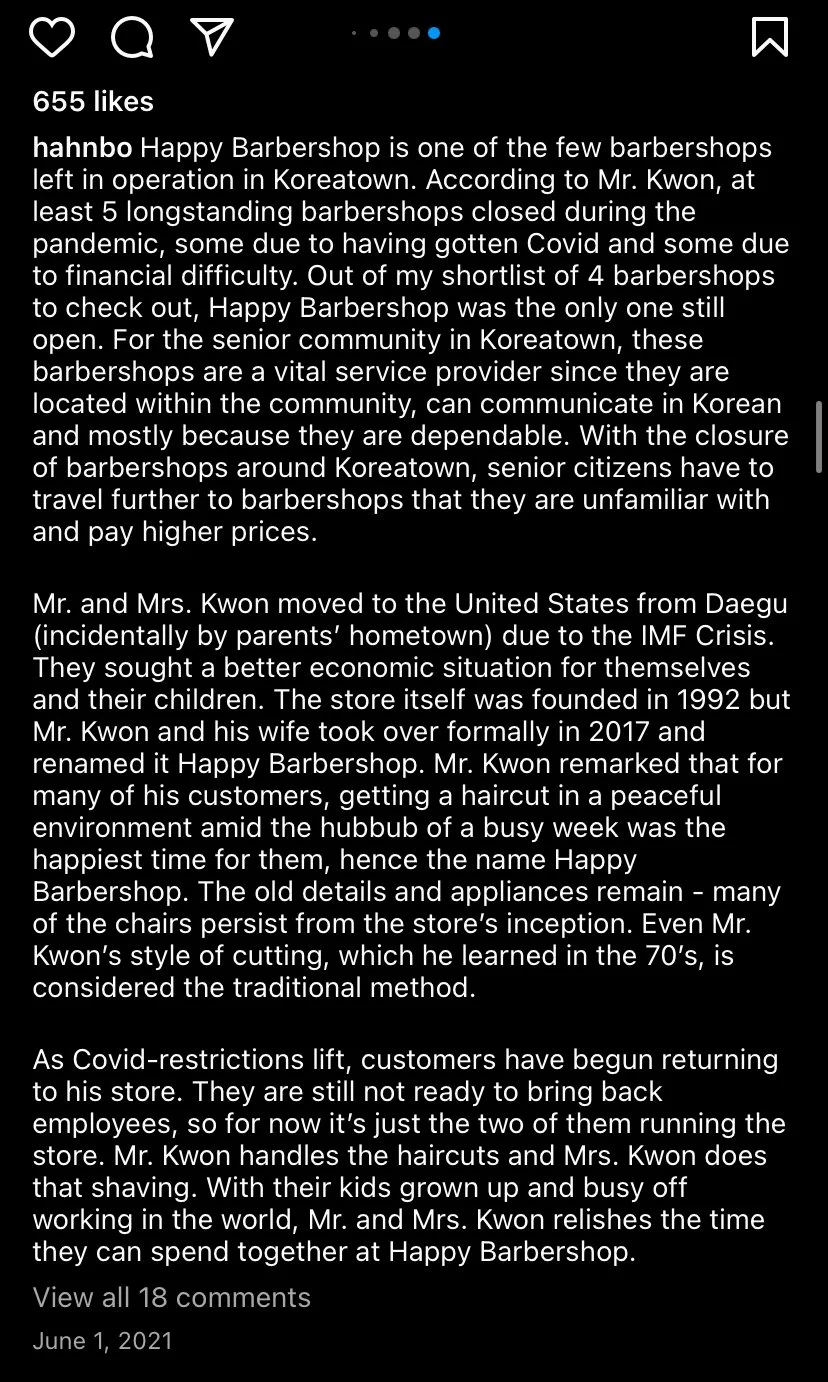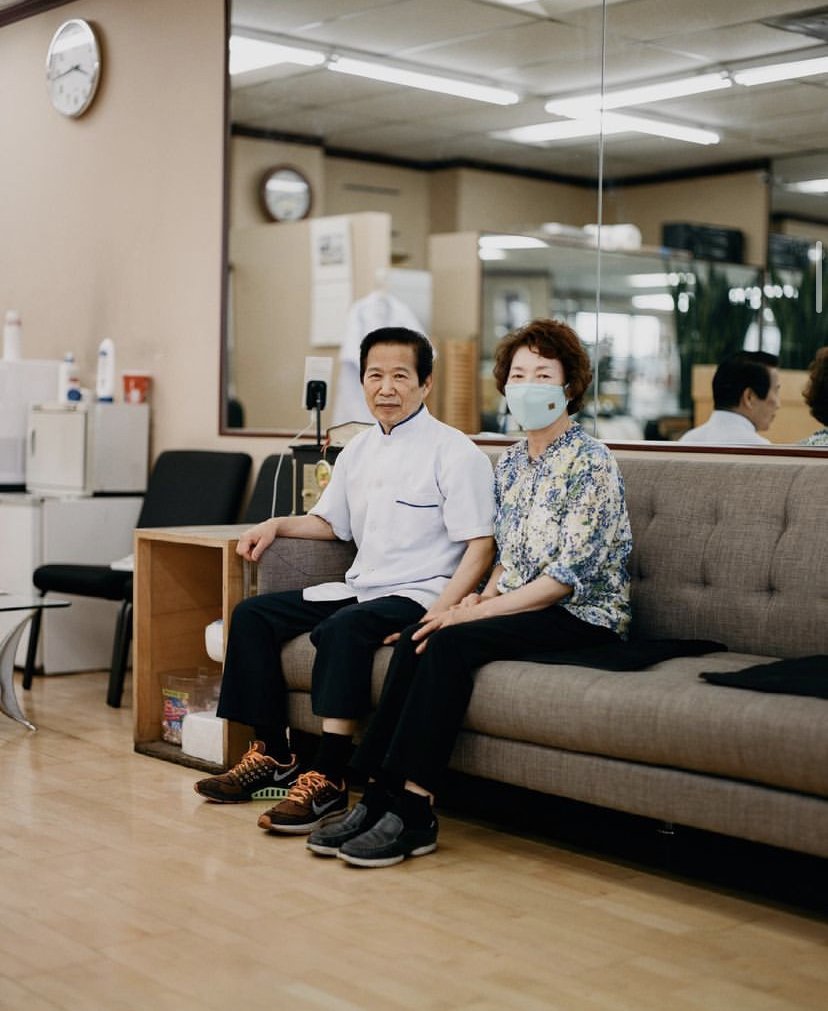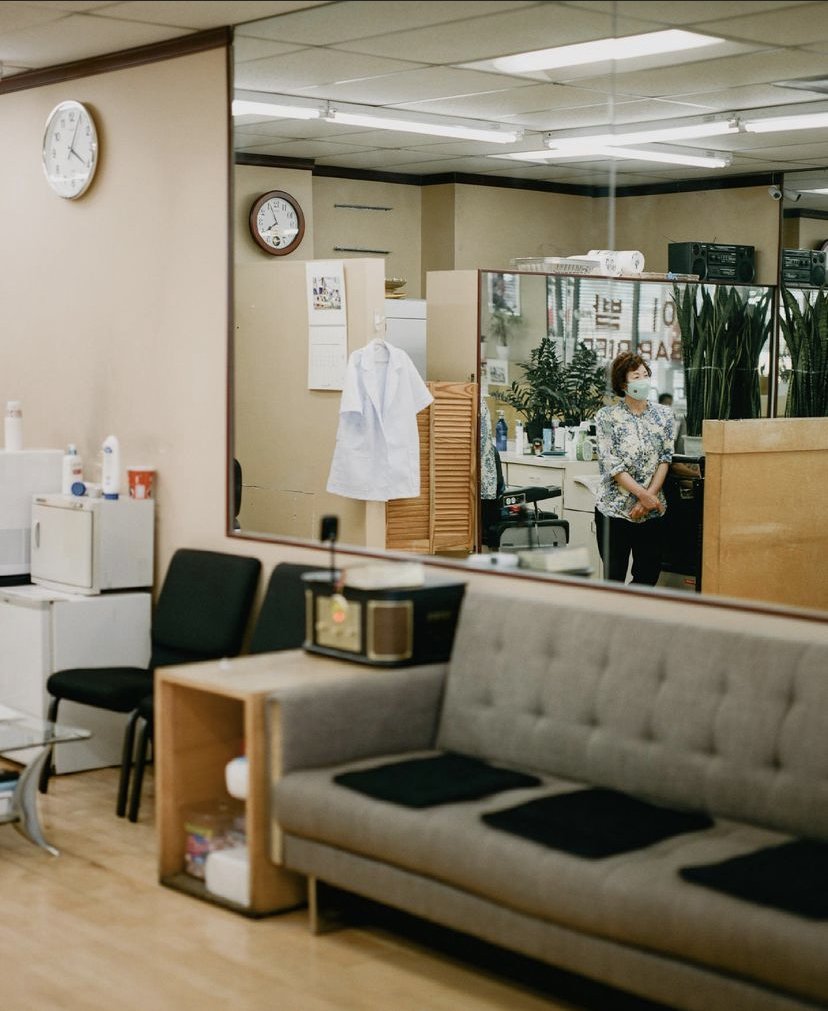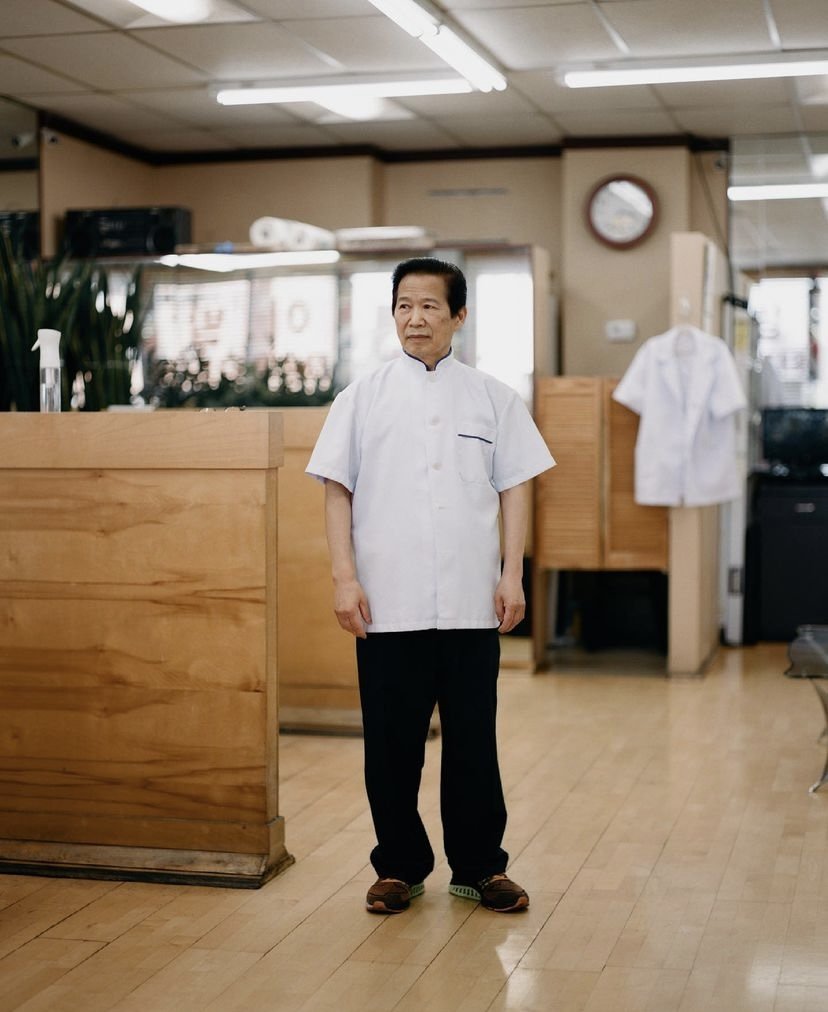My farm must succeed so that I can economically support my family, stop working the unfulfilling job of chicken sexing, and resolidify my position as the sole authority of the household.
The Economics of South Korean Immigration: Economic Frustration at Home and the Eventual Success for First Generation Korean Americans
Economic problems in South Korea have acted as a push factor for immigration to the United States. However, the United States struggles with many of the same economic problems.¹ Due to feeling disadvantaged in the American job market, South Korean immigrants turn towards entrepreneurship to advance economically. ² Using the immigrant family in Minari and my various media objects, I seek to explore how economics plays a role in causing immigration and the lives of immigrants after coming to a new country. The subtopic of my project is how South Korean women take a more active economic role outside of their traditional domestic duties due to the economic hardship caused by immigrating. ³ Their work outside the home goes against South Korean beliefs about the gendered division of labor. ⁴ Due to gendered labor being my subtopic, I will not adequately address the intricacies of gender. I will reference Teresa's project as she focuses on the intersection of culture, gender, and identity for first generation South Korean immigrant women.
A Brief History of South Korean Immigration to the United States
In the early 1900s, South Korean immigration to the United States began when Korean men went to Hawaii to make a fortune and return home. ⁵ Later during the Korean War, there were marriages between South Korean women and American military men. ⁶ These marriages ushered immigration of South Korean women and children to the United States for family reunification. ⁷
The Immigration and Nationality Act of 1965 made immigration more accessible to South Koreans because it ended pre-existing immigration quotas and gave fairer immigration opportunities, regardless of country of origin. ⁸ As a result, immigration from South Korea to the United States significantly increased and the Yi family in Minari came to the United States during the immigration waves following 1965. This increase was not just due to lessening restrictive immigration legislation, but social, political, and economic problems in South Korea. During the 1960s and 1970s, South Korea underwent urbanization and went from agricultural to industrial. ⁹ There were fewer job opportunities in South Korea, a surplus of college-educated individuals, political insecurity, and fears over war with North Korea. ¹⁰ College admissions were becoming increasingly competitive and expensive. ¹¹ South Koreans believed education served as "a mechanism for class reproduction rather than for social mobility.” ¹² As more South Koreans immigrated to the United States, family networks and Korean communities made immigration and employment easier for other South Koreans. ¹³
Jacob hints at economic trouble back when he talks to David about all that his father had lost in South Korea and all the land the family gained in the United States. ¹⁴ The land is a sign of wealth. Jacob believes the United States is where he will surpass his father's achievements and solidify the future for his children.
In 1988, South Korean immigration slowed, due to economic advancements in South Korea and the recession in the United States. ¹⁵ Immigration increased again in the early 2000s due to the economic crisis of 1997 and globalization. ¹⁶ More South Koreans were deciding to stay in the United States after visiting for job opportunities, internships, and school. ¹⁷ Globalization gave a high value to an English language education. The economic crisis of 1997 caused widespread unemployment, and many businesses, especially small businesses, failed. ¹⁸ However, not everyone suffered; some benefitted from the crisis and built on their wealth by exploiting "credit-scarce" situations. ¹⁹ The unequal effects of the economic crisis would increase the country's wealth gap.
South Korea’s Current Economic Problems
South Korean Street Interview
Asian Boss YouTube channel interviews South Koreans for their opinions on the country’s wealth gap. ²⁰
Nowadays, there exists a hopelessness in the prospects of South Koreans to make socioeconomic advancements. The YouTube channel Asian Boss frequently conducts street interviews to ask citizens of various Asian countries their opinions on hot topics. In a street interview with South Koreans, the interviewer asks them about the misconduct scandals surrounding the wealthy family that owns Korean Air. ²¹ The interviewees expressed disapproval of the behavior of the ultra-rich. ²² They also discussed how difficult socioeconomic advancement is, and how the wealthy appoint positions of power to their underqualified relatives. ²³ This frustration over hard work not equating socioeconomic advancement gives insight into why South Koreans want to immigrate to the United States. The United States portrays itself as a land of opportunity where hard work equals success, which is in direct contrast with how South Koreans view success in their society.
The popular film Parasite captures the South Korean wealth disparity. The film is about the Kim family. The Kim family is impoverished as they live in cramped, underground housing that often floods. ²⁵ The Kim family works for the the wealthy Park family by making up high-status credentials. ²⁶ In the basement of the Park family lives the husband of the household’s housekeeper. ²⁷ These two families fight against each other to keep their secrets, but it ultimately ends in murder. ²⁸ The father of the Kim family is stuck living in the basement and a wealthy family replaces the Park family. ²⁹ In this YouTube clip of the ending scene, the son of the Kim family dreams about one day buying the house and saving his father. ³⁰ This film illustrates how the wealthy are oblivious to the struggles of the working class.
The clip focuses on the son's dream, which parallels Jacob's dream for his farm. They dream of wealth and reuniting their family. These characters believe that their economic instability caused the problems that divided their families, both physically and emotionally. While both dreams seem unattainable, the Kim family's dream seems impossible. Parasite portrays the wealthy as impenetrable and the working class as replaceable.
Pop Culture: Parasite Clip
The ending scene of the movie Parasite. ²⁴
Parasite's success extended beyond South Korea as it deeply resonated with Western audiences. The film won four Oscars, including Best Picture. Parasite's commercial and critical success speaks to the universality of its message. People worldwide feel trapped in difficult or stagnant economic situations, while the wealthy just get wealthier.
In the United States, South Korean immigrants meet many of the same economic problems they had been seeking to escape. The United States also struggles with the cost of higher education being unaffordable, and prestigious universities being increasingly selective. The economy is competitive, and the United States has more "wealth and income inequality than any other advanced capitalist country in the world." ³¹ South Korean immigrants draw unfair comparisons between their country and the United States to validate their immigration. Yoon writes, "Faced with this dilemma, Korean immigrants to the United States selectively contrast positive aspects of American life with negative aspects of South Korean life to justify their decision to live in the United States." ³² Despite these problems in the United States, South Korean immigrants believe that returning to South Korea is not an option, because it would be a failure. ³³ Thus, South Koreans are motivated to succeed in the United States.
The Economic and Entrepreneurial Success of South Korean Immigrants
South Korean immigrants are regarded as an economically successful group. South Koreans have a higher median income than the average American. ³⁴ This data represents a larger group than the first-generation immigrants that my project focuses on, but it demonstrates the economic achievement of the group. Based on this data, it appears that South Koreans easily adapt and excel economically. In reality, South Korean immigrants feel undervalued in the job market and often exhibit downward mobility after moving to the United States. ³⁵ Following 1965, most South Korean immigrants were highly educated white-collar workers. ³⁶ In the United States, these workers struggled to compete for jobs of the same prestige and pay they had in South Korea, due to language barriers and difficulty understanding American customs. ³⁷
To gain economic autonomy, South Korean immigrants turned to entrepreneurship and relied on their ethnic community. ³⁸ In the United States, entrepreneurship is a desirable occupation, but South Korean immigrants did not use entrepreneurship for social status, nor did it advance their social status. ³⁹ Instead, these immigrants felt it was one of the few options to sustain themselves economically with the potential for growth. ⁴⁰ In "Sweet and Sour: Social Networks and Inequality in a Chinese Restaurant," one South Korean participant revealed that she moved to the United States for "socioeconomic mobility" but found herself experiencing downward mobility. ⁴¹ The participant even advised others to avoid immigrating to the United States, if they were doing sufficiently well in their current country. ⁴²
In Minari, Jacob does not intentionally pursue entrepreneurship. Jacob feels frustrated being overqualified and under-compensated for chicken sexing, which he considers demeaning work. He believes the success of his farm will economically support his family so that neither he nor his wife will ever have to chicken sex again. ⁴³ Jacob takes pride in his farm. He expects the farm to be his salvation from the humiliation he feels from not being able to fully support his family with his low-paying and low-status job.
South Koreans have the highest level of entrepreneurship among Asian groups. ⁴⁴ Many South Korean small businesses employ other South Koreans.1 South Koreans tend to engage in social circles with other South Koreans. ⁴⁵ They become socially and occupationally segregated. ⁴⁶ While this data on entrepreneurship, employment, and social circles pertains to South Koreans as a whole, South Korean immigrants also participate in the same behavior. In Minari, Jacob's farm relies on his selling his produce to a Korean grocery store. ⁴⁷ Even though the Yi family are the only Asians in their small Arkansas community, Jacob’s farm keeps him connected to South Korea and the immigrant community. South Korean immigrants provide a community of economic support.
In hahnbo's Instagram post, Mr. Kwon says that he came to the United States because of the instability of the economic crisis of 1997 in South Korea, and the economic prospects.⁴⁸ With his wife, they took over a barbershop. ⁴⁹ The Kwons are an example of coming to the United States after economic distress and starting a small business that serves the Koreatown community. ⁵⁰
An Instagram post by hahnbo features the photos and the story of the Kwon family. ⁵¹









As part of KoreanAmericanStory.org's Legacy Project, Baik Kyu Kim tells his story of starting a small grocery store and working long hours every day of the week. ⁵² He felt that his efforts paid off in the United States. ⁵³ Kim also recounts how the Korean community's solidarity resulted in raising millions of dollars in just a few months to fund rebuilding a Korean assembly hall. ⁵⁴ Baik Kyu Kim and the Kwons share similar experiences with entrepreneurship, and they take pride in the assistance their ethnic community provides. ⁵⁵
However, these ethnic ties can be a source of labor exploitation. Workers with the same ethnicity as their employers do enjoy benefits that help them with employment or economic support. ⁵⁷ Yet, a stifling "culture of reciprocity" arises, and employees feel they cannot speak out against mistreatment. ⁵⁸ Mistreatment includes wage theft, long hours, and blurred boundaries surrounding work. ⁵⁹ These ethnic communities help South Korean immigrants, simultaneously leaving them more vulnerable to unfair working conditions. ⁶⁰
Baik Kyu Kim is an elderly first generation South Korean immigrant who is interviewed about his experience in the United States. ⁵⁶
Immigrants’ Economic Survival and its Pressure on Gendered Divisions Labor
The NPR News segment discusses gender equality in South Korea with the author of the book "Kim Ji-young, Born 1982". ⁶⁹ The book follows the life of an ordinary South Korean woman. However, it critiques the patriarchal society in South Korea. ⁷⁰ "Kim Ji-young, Born 1982" is part of a growing feminist movement. ⁷¹ A movement that faces resistance from some Korean men and even governmental officials. ⁷² South Korean women have become more active in challenging their country's patriarchal beliefs.
NPR radio interview of the author of the book "Kim Ji-young, Born 1982.” ⁶⁸
There has been gradual progress in gender equality in South Korea. However, immigration can cause a sudden economic instability, that forces South Korean women into work for "economic survival." ⁶¹ As a result of the social and economic segregation of South Korean immigrants, it can be difficult to challenge patriarchal ideas around gender, even when surrounded by America’s more progressive views on gender. ⁶² South Korea's ideas of gendered labor delegate women to domestic work, focused on childrearing and men's work outside the home to provide for the family economically. ⁶³ Confucianism gave men dominance and decision-making power. ⁶⁴ While South Korean women have high educational attainment levels, only half of women work outside the home. ⁶⁵ Even women who do work frequently quit work following marriage. ⁶⁶ As mothers, South Korean women are expected to devote their lives to their children and their children's education. ⁶⁷
South Korean immigrant women often believe they do not have a choice in working outside the home, because of their dire economic situations. ⁷³ South Korean immigrant women make significant economic contributions to their families. ⁷⁴ The more paid work South Korean immigrant women participate, the more marital issues arise. ⁷⁵ The husband’s inability to solely provide for their family can be emasculating. ⁷⁶ As a result, the men may exert more dominance in the home to compensate. ⁷⁷ As South Korean immigrant women’s income increases, they are more likely to ask their husbands to participate in domestic chores and have increased bargaining power. ⁷⁸ The male participation in nontraditional gendered labor and the increased decision-making power of women may appear subversive, but the core beliefs about gender remain unchanged. ⁷⁹ It is only the difficult economic circumstances that bring about reluctant shifts. Immigration does not cause an upheaval of South Korean ideas of gender.
Small businesses often result in the husband and wife working long hours together, like the Kwon family's barbershop ⁸⁰ or Jacob and Monica in Minari. ⁸¹ The constant time spent together can add pressure to marriages. ⁸² Small businesses are usually under the husband's name. ⁸³ Even if South Korean immigrant wives play a prominent role in the business, they are still legal subordinates.
Initially, South Korean immigrant women viewed their outside labor negatively because they believe having to engage in paid work is representative of their downward mobility. ⁸⁴South Korea views women not having to work outside the home as a sign of wealth. ⁸⁵ This lower socioeconomic status may be jarring since many South Korean immigrants after 1965 belonged to middle and upper class. ⁸⁶ These women find it difficult to feel empowered by their work because their jobs are often low-paying, low status, in the service industry, and they only work for their family's survival. ⁸⁷ South Korean immigrant mothers attempt to justify their choices to work outside the home and spend less time with their children by seeing it as an investment in their children's American future. ⁸⁸ Eventually, South Korean women began to take pride in their work and the economic contributions to their families. ⁸⁹
Jacob finds chicken sexing beneath him, but he is highly proficient at it. As Jacob becomes increasingly focused and fatigued by his farm work, Monica surpasses him in their outside work. ⁹⁰ Monica only began working six months before the film starts, but she spends her free time practicing how to chicken sex. ⁹¹ Throughout the film, Jacob prioritizes his dream of the farm over his family and economic stability. Jacob even uses the family's water for his crops. ⁹² He is aware of the pressure to provide for his family as the man of the house and his failure to fulfil his gendered duty. Jacob hopes that once the farm becomes successful, the economic burden on the family will be released. They will return to being a harmonious family where his position as patriarch is unquestioned.
With newfound confidence from work and pent-up frustration from being ignored, Monica threatens to leave Jacob. ⁹³ Even though she is contributing equally in income, she still has barely any decision-making power. Jacob uses their family money and resources without consulting her. ⁹⁴Jacob ignores Monica's pleas to move back to California. ⁹⁵ Monica believes that the family will suffer economic ruin under Jacob's current leadership and that for her children, she must leave Jacob and take them to economic safety in California. ⁹⁶ Monica feels that she can only demonstrate decision-making when separate from him. She is reluctant to leave him because she loves him and is used to depending on him as the patriarch of the family. Even as Monica takes an increasingly active role economically and vocally, Jacob does not treat Monica as an equal. Teresa’s project expands upon gender beyond economics by focusing on gender through dual culture identity and intersectionality.
While the South Korean patriarchal ideas originate from Confucianism, they share similar beliefs on gender with the patriarchal feudal Catholicism of the Philippines. ⁹⁷ It has become common for Filipina mothers to participate in domestic labor overseas to provide economic support for their families. ⁹⁸ Motherhood had been confined to a domestic role, but now it has been shifting to include an economic role. ⁹⁹ The Philippines' economic struggles, lack of job security, and the increasing cost of living make this migration of Filipina mothers for work increasingly common. ¹⁰⁰
There are distinctive differences in the culture and circumstance between the migration of South Korean and Filipina women. However, there are similarities; like the South Korean immigrants, Filipina mothers grapple with the lack of time with their children and hope that their new ability to provide will advance their children's lives. ¹⁰¹ There exists a redefining of motherhood. ¹⁰² Similarly, the new economic role of Filipina mothers has been questioned as a form of empowerment and whether it is subversive to the patriarchy. ¹⁰³ Ultimately, outsourcing domestic labor conforms to ideas of gendered labor surrounding Filipinas as submissive caretakers. ¹⁰⁴ Both South Korean and Filipina women have become stronger economic providers, while still upholding ingrained beliefs about gender.
Conclusion
Conclusion
South Korean immigrants dream of the United States as the land of economic prosperity they cannot reach in South Korea. Far from the idealized United States of their imagination, these immigrants face downward mobility, economic instability ¹⁰⁵, and shifts in gendered labor. ¹⁰⁶ Equipped with a strong determination and a refusal to accept failure, first-generation South Koreans overcome these obstacles to emerge as a thriving group. ¹⁰⁷ They rely on entrepreneurship and their ethnic community for economic mobility. ¹⁰⁸ The first-generation South Koreans establish themselves in the United States with the dream that their future generations will accomplish even further educational and economic success. ¹⁰⁹
Notes
Berberoglu, B. (2017). The Nature, Extent and Sources of Wealth and Income Inequality in the United States. International Review of Modern Sociology, 43(2), 193–216. https://www.jstor.org/stable/48602743
Min, P. G. (2013). The Korean Community in the United States: Changes in the Twenty-First Century. The Research Center for Korean Community at Queens College.
Min, P. G. (2001). Changes in Korean Immigrants’ Gender Role and Social Status, and Their Marital Conflicts. Sociological Forum, 16(2), 301–320. http://www.jstor.org/stable/6850673.
Park, K. (2008). “I Can Provide for my Children”: Korean Immigrant Women’s Changing Perspectives on Work Outside the Home. Gender Issues, 25(1), 26-42.
Yoon, I.-J. (1997). A Cohort Analysis of Korean Immigrants’ Class Backgrounds and Socioeconomic Status in the United States. Korea Journal of Population and Development, 26(1), 61–81. http://www.jstor.org/stable/43783494
Ibid.
Ibid.
Min, P. G. (2011). The Immigration of Koreans to the United States: A Review of 45 Year (1965-2009) Trends. Development and Society, 40(2), 195–223. http://www.jstor.org/stable/deveandsoci.40.2.195
Yoon, “A Cohort Analysis.”
Ibid
Ibid
Koo, H. (2007). The Changing Faces of Inequality in South Korea in the Age of Globalization. Korean Studies, 31, 1–18. http://www.jstor.org/stable/23720158
Yoon, “A Cohort Analysis.”
Chung, L. (Director). (2021). Minari [Film].
Yoon, “A Cohort Analysis.”
Min, “The Immigration of Koreans.”
Ibid.
Koo, “The Changing Faces of Inequality.”
Ibid.
Asian Boss. (2018, June 25). What Koreans Think Of The Wealth Gap In Korea (Korean Air Scandal) | Asian Boss [Video]. YouTube. https://www.youtube.com/watch?v=unQAEP_Um14
Ibid.
Ibid.
Ibid.
A D. (2021, October 7). Parasite Ending Scene [Video]. YouTube. https://www.youtube.com/watch?v=LCUo5bnU35U
Joon-ho, B. (Director). (2019). Parasite. [Film]. Neon.
Ibid.
Ibid.
Ibid.
Ibid.
A D, Parasite Ending Scene.
Berberoglu, “The Nature, Extent and Sources of Wealth and Income Inequality in the United States.”
Yoon, “A Cohort Analysis of Korean Immigrants’ Class Backgrounds and Socioeconomic Status in the United States.”
Ibid.
Yoon, K. E., Pan, Y., & Lubkemann, S. (2012). Observing Census Enumeration of Nonenglish Speaking Households in the 2010 Census: Korean Report. Survey Methodology, 7.
Min, “The Korean Community.”
Ibid.
Ibid.
Ibid.
Ibid.
Ibid.
Hill, K. M. (2018). Sweet and Sour: Social Networks and Inequality in a Chinese Restaurant. Sociology of Race and Ethnicity (Thousand Oaks, Calif.), 4(1), 114–127. https://doi.org/10.1177/2332649217705673
Ibid.
Chung, Minari.
Yoon, “Observing Census.”
Min, “The Korean Community.”
Ibid.
Chung, Minari.
Hahn, E. [@hahnno]. (2021, June 1). Happy Barbershop is one of the few barbershops left in operation in Koreatown [Instagram photo]. Retrieved from https://www.instagram.com/p/CPlW5iNMq03/?next=%2Fhahnbo%2F&hl=en
Ibid.
Ibid.
Ibid.
KoreanAmericanStory.org. (2016, April 4). Legacy Project Video: Baik Kyu Kim [Video]. YouTube. youtube.com/watch?v=6uLYnP_Zfnk
Ibid.
Ibid.
Ibid.
Ibid.
Hill, “Sweet and Sour.”
Ibid.
Ibid.
Ibid.
Min, P. G. (2001). Changes in Korean Immigrants’ Gender Role and Social Status, and Their Marital Conflicts. Sociological Forum, 16(2), 301–320. http://www.jstor.org/stable/685067
Ibid.
Ibid.
Ibid.
Garcia-Navarro, L. (Host). (2020, April 19). South Korean Bestseller 'Kim Jiyoung, Born 1982' Gives Public Voice To Private Pain [Radio broadcast episode/] https://www.npr.org/2020/04/19/835486224/south-korean-bestseller-kim-jiyoung-born-1982-gives-public-voice-to-private-pain
Min, “Changes in Korean.”
Ibid.
Garcia-Navarro,, “South Korean Bestseller.”
Ibid.
Ibid.
Ibid.
Ibid.
Min, “Changes in Korean.”
Ibid.
Ibid.
Ibid.
Ibid.
Ibid.
Ibid.
Hahn, “Happy Barbershop.”
Min, “Changes in Korean.”
Park, “I Can Provide for my Children.”
Ibid.
Ibid.
Ibid.
Min, “The Korean Community.”
Park, “I Can Provide for my Children.”
Ibid.
Ibid.
Chung, Minari.
Ibid.
Ibid.
Ibid.
Ibid.
Ibid.
Ibid.
Francisco-Menchavez, V. (2019). A Mother Who Leaves is a Mother Who Loves: Labor Migration as Part of the Filipina Life Course and Motherhood. Journal of Asian American Studies, 22(1), 85–102. https://doi.org/10.1353/jaas.2019.0008
Ibid.
Ibid.
Ibid.
Ibid.
Ibid.
Ibid.
Ibid.
Min, “The Korean Community.”
Park, “I Can Provide for my Children.”
Yoon, “Observing Census.”
Min, “The Korean Community.”
Park, “I Can Provide for my Children.”
Media Credits in Order of Appearance
Minari directed by Lee Issac Chung accessed through https://digitalcampus-swankmp-net.proxy.library.vanderbilt.edu/vu374190/play/7478190435199d96
Photo by Lachlan Milne via https://www.fsunews.com/story/entertainment/2021/02/21/minari-depicts-american-dream-honest-enchanting-manner/4518448001/
YouTube video by Asian Boss via https://www.youtube.com/watch?v=unQAEP_Um14
Parasite directed by Bong Joon-ho
YouTube video by channel A D via https://www.youtube.com/watch?v=LCUo5bnU35U
Photo by Kevin Winte via https://www.timesofisrael.com/parasite-makes-oscars-history-with-stunning-best-picture-win/
Instagram Post by Emanuel Hahn on hahnbo account via https://www.instagram.com/p/CPlW5iNMq03/?next=%2Fhahnbo%2F&hl=en
YouTube Video by channel KoreanAmericanStory.org via https://www.youtube.com/watch?v=6uLYnP_Zfnk
NPR Radio Segment by Lulu Garcia-Navarro via https://www.npr.org/2020/04/19/835486224/south-korean-bestseller-kim-jiyoung-born-1982-gives-public-voice-to-private-pain
Photo by Lachlan Milne via https://film-grab.com/2021/07/02/minari/#bwg2914/178183



